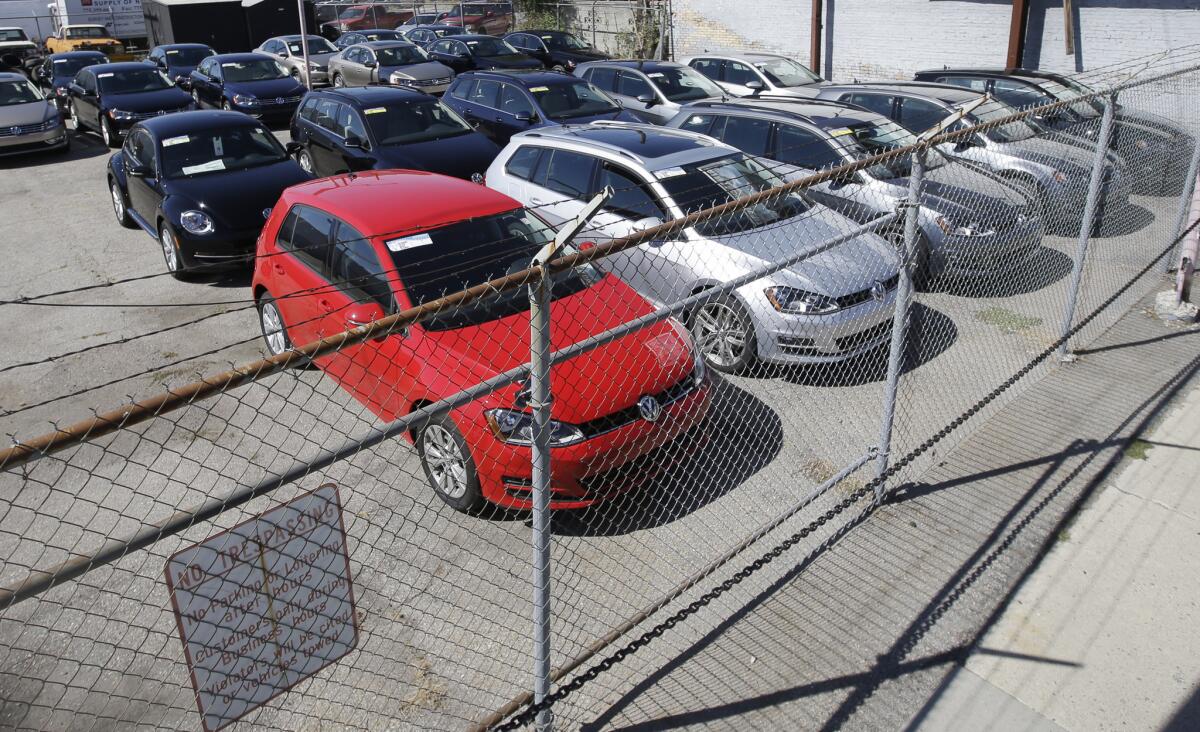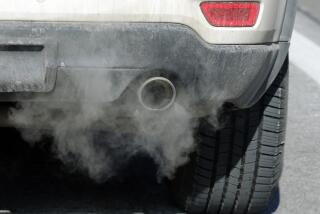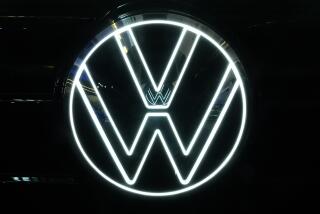Readers React: How Volkswagen should pay for its diesel deceit

Volkswagen diesels are shown behind a security fence on a storage lot near a VW dealership in Salt Lake City.
Volkswagen customers worldwide have expressed shock and betrayal after the company admitted two weeks ago to outfitting its diesel-powered cars with software to cheat on emissions tests.
The scandal continues to have legs, and the conversation now seems to revolve around figuring out what’s next — for Volkswagen, for its customers and for the hundreds of thousands of affected cars “spewing 10 to 40 times the allowed amount of nitrogen oxide into the air,” as Ian Ayres wrote in The Times this week.
Times readers — sore VW customers and interested citizens alike — wrote us about Volkswagen’s dishonesty and the long road it has to travel to make amends.
Spencer Grant of Laguna Niguel commented on Volkswagen’s sullied reputation:
I can’t help thinking of a 1956 article in Popular Mechanics that said of the VW bug that put the company on the map, “Volkswagen succeeds because it is an honest car. It has nothing that is not needed.”
Bug, where are you now? Buried under a pile of corporate greed and overreaching.
Remember, VW’s cheating was more than a scandal, it was a crime, said Cynthia Carle of L.A.:
There’s a simple test to determine whether an action is a crime or a mistake. If the word “whoops” can reasonably be used, what you have is a mistake. If not, you’re looking at a crime. “Whoops, I should’ve turned left on La Cienega.” That’s a mistake. “Whoops, we deliberately conceived, designed and installed a defeat mechanism to foil emissions tests.” That’s a crime and should be dealt with accordingly.
Marvin Beitner of Long Beach pointed out that correcting Volkswagen’s mistakes may take some persuasion:
Ian Ayres is exactly correct in his surmise that many owners “won’t bother to comply” with the optional repair of their vehicles, both because of the nuisance of taking the vehicle in for repair, and because of the resultant expense due to decreased fuel efficiency.
Psychological research has indicated that people are unlikely to take actions based on some intangible or distant reward such as the “greater good” of improved air quality and future health benefits for all. This is especially true when there is an immediate personal disincentive such as inconvenience.
Greater compliance for actions for “the greater good” could be strongly reinforced by the simple, immediate and direct reward of giving the owner of the vehicle a financial incentive to have their vehicle repaired.
L.A. resident and Volkswagen owner Nancy Greep requested giving the customers what they paid for:
Like many, I bought a VW diesel sport wagon a few years ago thinking it was a “green” car. [The Times] reported that it would cost around $33,000 to fix each car. I suggest that VW simply give duped owners new ones. They owe it to us.
Maybe the solution is to force VW to sell clean cars, for real this time, said Robert Johnson of Santa Barbara:
Perhaps it’s an overly simplistic answer to the problem, but I propose as a punishment, we restrict VW to only be allowed sell zero-emission vehicles. No fines. No prosecutions. Just a simple “take it or leave it.” And, who knows? — maybe in a few years this “punishment” will actually set them up as a healthier company better prepared to address the needs of a carbon-saturated planet.
Mary Clumeck of Santa Ana recommends a change that doesn’t depend on VW taking action:
The criminal tampering of the Volkswagen diesel engines to evade clean-air regulations, while shocking, serves to illustrate why more reliable methods are needed to lower carbon emissions. A fully refunded, revenue-neutral carbon tax, for instance, would be applied “upstream” at the oil well, mine or port of entry. Such a tax is better subject to oversight and relies on market forces to not only reduce burning carbon, but also boost renewable energy development and improve the economy. And all this could be done without relying on the integrity of individual company executives -- which, as we see, can be found wanting.
S.R. Fischer of L.A. expressed rare appreciation:
Thank you to the people who found the bug in Volkswagen’s Bug.
Follow the Opinion section on Twitter @latimesopinion and Facebook
More to Read
A cure for the common opinion
Get thought-provoking perspectives with our weekly newsletter.
You may occasionally receive promotional content from the Los Angeles Times.










